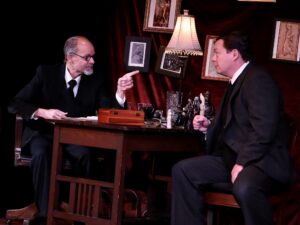Freud’s Incredibly Witty Last Session
November 26, 2025
A review from Shepherd Express by Natalie Murray:
L to R: David Sapiro and Jason Will Photo: Melinda Rhodebeck
I never expected to set foot in Freud’s study, let alone back in 1939 on the cusp of World War II … but this weekend, I found myself in that exact position while seeing Acacia Theatre’s production of Freud’s Last Session. The play, which brings to life a hypothetical conversation between Sigmund Freud (David Sapiro) and C.S. Lewis (Jason Will), was directed for the second time by Elaine Wyler, and its staging in the Norvell Commons kept it intimate and captivating.
Set and properties designer Abbey Pitchford transformed the stage into what could pass as an exact replica of the room at 20 Maresfield Gardens—no detail was spared. Across the floor and walls were hung carpets, giving the study a greater depth, and the many bookshelves were filled to the brim with books and collectors’ treasures that could only belong to a man who has taken the time to study histories and cultures outside of his own. The light design, done by Dan Hummel, was kept simple and warm, using onstage standing lamps as effective practical lighting.
The script itself is incredibly witty, even from the first remark made by Freud to his dog, Jofi. Lewis and Freud were two of the most prolific academics of their time, and their repartee needed to reflect that. Their conversation dips and peaks and makes U-turns as the two men debate, and while such a dense script must be difficult to keep fresh and lively, the two actors did a tremendous job portraying their characters replying off-the-cuff. Each jab of humor was found in the moment, and every question that couldn’t receive a quick answer was sufficiently turned over in its respondent’s head. Freud’s cleverness was dry and sardonic, but Lewis’s brighter quips did not read as naive in comparison—rather, the two complemented each other.
While I would’ve been content to watch Sapiro and Will hash out the question of if there is a God simply seated at Freud’s desk for the full performance, their movement around the space informed their characters’ motivations and overall demeanor. Will moved about the room freely—gracefully, even—as Lewis had a lighter quality about him, but he especially could not sit still when he was nervous or excited about an anecdote he had to share. Meanwhile, Sapiro, playing a Freud who had 42 years on his scene partner, was much stiffer, though dignified. He remained at his desk chair for the majority of the play, primarily standing up when irritated.
Deliberate Choices
Each actor also had a set of ticks; it was fascinating to watch such deliberate choices being made to distinguish the two scholars. Sapiro especially was quite deliberate with when he reminded the audience of the rotting pain that was ever-present in Freud’s upper jaw—when he reached for a cigar box, I physically cringed. By the climax of the show, I presume each audience member, like me, could almost feel the discomfort in their own mouths. The practical blood effects used then were just enough to elicit a reaction from those of us watching, without becoming gratuitous.
The denouement allowed both the characters and the audience to sit in the conclusion of an inconclusive discussion—because as Lewis points out, it was “madness” to presume to answer the world’s greatest question in one afternoon. Freud’s response stuck with me: “There is only one greater madness: not to think of it at all.” Though the overarching tone of the debate was full of mutual respect, heated moments had arisen, to be sure. And yet, neither party diverted from their shared belief that open, honest dialogue can only promote knowledge, and to shut oneself out from a dissenting opinion is to refuse to learn and potentially grow.
Wyler’s note at the front of the program opened with the sentiment that “we live in divisive times …” and while this play took place over the backdrop of air raids and the start of a world war, it remains true that any and all times could be categorized as divisive. And though a work of fiction, bearing witness to an intellectually stimulating conversation between two men who recognize themselves as equals despite their differences in fundamental beliefs—and who are willing to admit the swath of similarities they share—was refreshing. Dare I say, it even gave me a little hope.
See the full review here.

